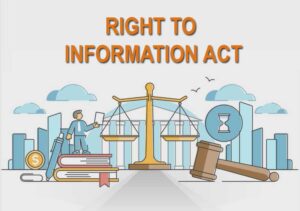RIGHT TO INFORMATION APPLICATION (RTI)
 Information is a very important part of a civil society. It helps a citizen to take decisions which are beneficial to him/her and his/her family. In the absence of correct information, rights of the citizen cannot be exercised. Therefore, Right to Information (RTI) has been recognised as a fundamental right under Article 19(1)(a), i.e. Right to Freedom of Speech and Expression, of the Constitution of India.
Information is a very important part of a civil society. It helps a citizen to take decisions which are beneficial to him/her and his/her family. In the absence of correct information, rights of the citizen cannot be exercised. Therefore, Right to Information (RTI) has been recognised as a fundamental right under Article 19(1)(a), i.e. Right to Freedom of Speech and Expression, of the Constitution of India.
From time-to-time Hon’ble Supreme Court of India has also reiterated that Citizens of the country have a right to know about the proper functioning of the government systems. It is an essential tool for the Citizen for assessment of the workings of the government and its departments.
Therefore, in the year 2005, Right to Information Act 2005 (RTI Act 2005) was enacted by the Parliament for setting out a practical regime for citizens to secure information under the control of public authorities and to promote transparency and accountability.
Vide the RTI Act of 2005, Central Information Commission and State Information Commission were constituted to regulate and supervise that proper information is given by the authorities to the concerned citizens.
As per the RTI Act, each and every department of the government be it at the District Level, State Level, or Central Level has to designate one or more Public Information Officers to provide information to persons requesting for the information under this RTI Act.
A request for information must be made in writing or by electronic means by the person accompanying requisite fee. The person requesting information is not required to give the reasons for requesting the information or the personal details apart from what is necessary to contact the person.
Section 7 prescribes that the request so received has to be reverted to within a period of 30 days from the date of receipt of the request.
Certain information is not eligible to be given to Citizens mentioned in Section 8 of the Right to Information Act 2005. Some of them being,
- Information affecting the sovereignty or integrity of India
- Information disclosure of which is forbidden or restricted by a court of law
- Information in breach of privilege of Parliament or State Legislature
- Information relating to commercial confidence, trade secrets or intellectual property
- Information endangering public safety or safety of a person
- Information impeding or restricting investigation of authorities in criminal offences
(Note: The above list is not exhaustive).
However, a person who is aggrieved by non-receipt of an information may file an appeal under Section 19 of the RTI Act to a person senior to Public Information Officer within a period of 30 days from the date of receipt of non-disclosure.
A second appeal may also be preferred before the Central or State Information Commission within a period of 90 days from the date of receipt of first appellate order.
You may be interested in getting more information on other laws. Check out our Practice Areas and Articles Page.